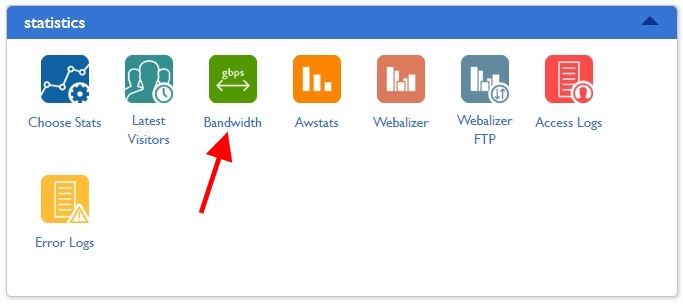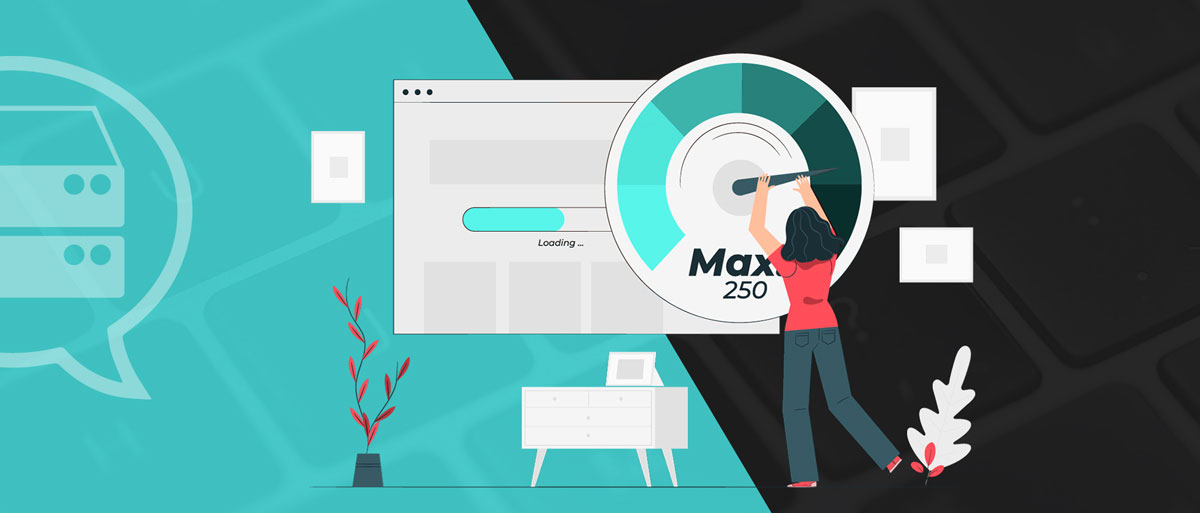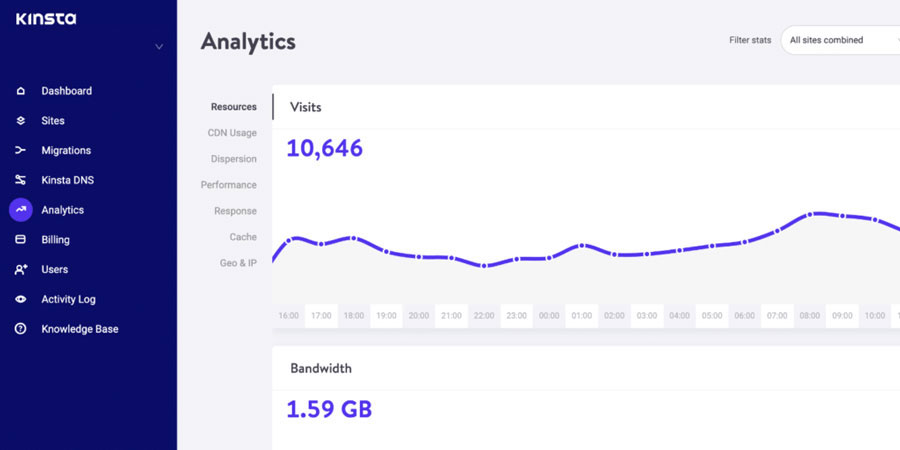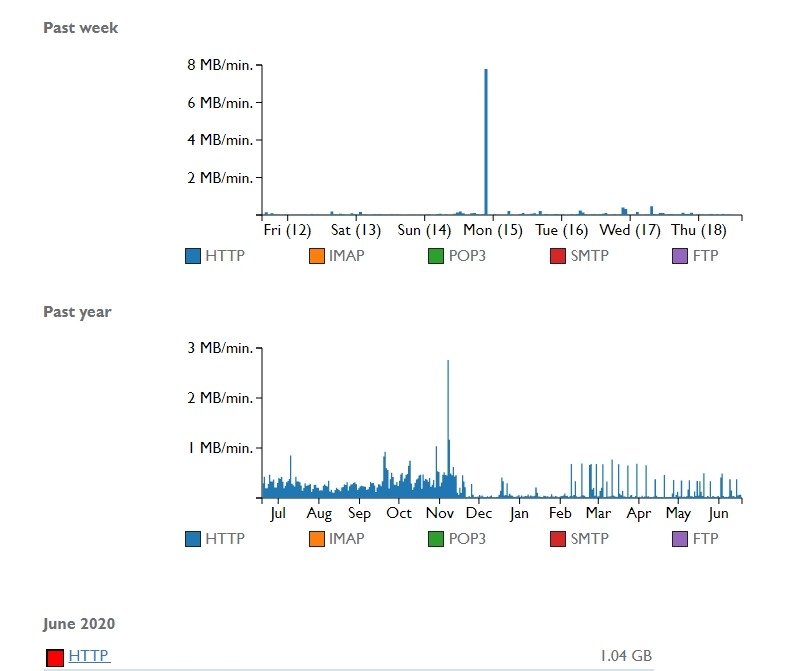Bandwidth in terms of web hosting means the size of data that you can download from a website in a given period of time. The question is 2GB bandwidth sufficient for a website? Well, it depends.
This is an important factor that people often overlook when they choose their web hosting.
Knowing how much bandwidth you need is very important because the last thing you want is to exceed your bandwidth limit which can cause a lot of problems.
Luckily in this tutorial, we will see everything there is to know about bandwidth and how you can calculate the amount of bandwidth you need for your site, that way you’ll have the right answer to your question.
What is website bandwidth?
Website Bandwidth refers to the maximum amount of files you can download from a web page usually per month.
For example, every time someone visits your homepage, to view the page, the server loads several files such as Images, Gifs, Videos, HTML, CSS, JS, etc. Each one of these files weighs a few Kilobytes or more. Let’s say all the page’s files combined have a total size of 10KB.
So, if the same page is viewed and loaded by 10 visitors that means you’ll have used up 100KB of your bandwidth. Let’s say that’s the total number of visitors you get daily, you take your daily bandwidth of 100KB and we multiply it by 30 days and we get 3000KB of bandwidth per month.
Keep into consideration that you have more than one page on your site, so that means, you will most likely consume a lot more bandwidth. So you get the idea!
Types of Bandwidth offered
In the previous section, we say that you can’t simply calculate the bandwidth. So, what’s the solution? How much bandwidth you should select?
Well, before we get into how much bandwidth you should select, let’s understand the types of web hosting bandwidth offered by the web hosting services.
There are generally three types of bandwidth allocation that you will see:
- Metered Bandwidth
- Unmetered bandwidth
- Unlimited bandwidth
Let’s understand all three of them in brief.
Metered Bandwidth
You won’t find the exact term in the hosting plan. The plan won’t say that you will get metered hosting.
Instead, you will see the amount of bandwidth you will get. For example, it will be 1 GB, 5 GB, 15 GB, and so on.
Depending on pricing, you will get the allocation. Usually, if you go with an affordable hosting plan, the bandwidth is unmetered.
Some of the hosting services also count bandwidth in the number of visitors. You will see that you are allowed to have up to 25k visitors per month.
If you are planning to go with metered hosting, you will have to optimize your website to use the least amount of bandwidth. Also, you will need to find the average size of the web pages.
Unmetered Bandwidth
Unmetered bandwidth will sound like a new term for many beginners. Unmetered bandwidth is where the hosting company has allocated a specific limit to their server.
There are numerous websites hosted on a single server. Many accounts on a web hosting service will use the same server resource.
So, in unmetered bandwidth, they don’t count the bandwidth per account or per website. Instead, there is a specific limit allocated to the server. Let’s say, it’s 1000 GB. So, all the accounts combined shouldn’t exceed that particular limit.
You don’t need to worry here as the limit in most web hosting websites is a lot more and will probably never be exhausted.
So, you can treat unmetered hosting as unlimited hosting. There is a difference but it won’t affect you in most cases.
In shared hosting, you pay a fixed price for the hosting. Whereas if you choose to go with cloud hosting, you will have to pay as per the usage. So, if you use 10 GB of your unmetered hosting, you will only have to pay for 10 GB.
Unlimited Bandwidth
So, you might think that if unmetered also has a limit then why not just go with unlimited bandwidth, right?
Well, honestly, there is no such thing as “Unlimited” when it comes to web hosting.
Unlimited is not practically possible. In reality, the bandwidth limit is so high that you won’t touch it. So, it is just like unmetered hosting.
The reason why they write unlimited is to make things easier for beginners. Therefore, you can choose unlimited or unmetered, you will be choosing the same one. They are just two different terms that have almost the same meaning (when it comes to web hosting).
Bandwidth write Time
This isn’t a type of bandwidth that companies offer but in some of the cloud services, you might see that bandwidth is a writer as 10 Mbps. Here, the speed of the server is also calculated along with the size. In simpler words, the server is capable of loading 10 MB per second.
As a beginner, you won’t find this but this is for your knowledge.
How do I know how much bandwidth my website uses?
Assuming you are running your website with a hosting provider that offers “cPanel” like Bluehost for example, just go to the control panel and scroll down to the “Statistics” section. Inside it click on “Bandwidth”.

Is 2gb bandwidth sufficient for a website?
2GB bandwidth can be sufficient for websites like private blogs with light informational content. Every site has different needs when it comes to bandwidth, so it depends on your web page sizes and the amount of traffic it gets monthly.
If you are planning to have a website that will offer your guests to play or download videos, music records, or a possibility to download multiple files from your site, this will likely require you to have a much higher bandwidth than 2GB.
For new or moderate traffic sites, Hostinger starter plan should be more than enough to handle it thanks to its unmetered bandwidth.
While you should also keep in mind that your site will continue to grow, more pages will be added and hopefully, your traffic will keep on increasing. So taking that into factor, helps make a better and clear decision for the long term.
So to know how much bandwidth we need, we must know before how much bandwidth we’re currently using, which will see next.
How to calculate website bandwidth usage?
Knowing the actual need in bandwidth for your site is very important, here is how to calculate it:
The easy calculation: If the webpage is 50 kb and you get 5 visits, the total bandwidth used is 50 x 5 = 250 kb.
But that’s not how you calculate the bandwidth of a website. As a visitor won’t visit only one webpage, right? They might come to your homepage and then open one of your blog posts. So, you will also have to calculate the number of visits.
Here are steps on how to calculate web hosting bandwidth:
- Look at the number of visitors you have on your website. Of course, if you have not yet made the website live, you will have to take an average number.
- See how many pages your website has. Generally, an average visitor will visit 4 to 5 webpages in a blog. If your blog is really interesting and you have many webpages, they might visit more. So, it depends on your website.
- Calculate the average size of webpages.
- Multiply all of them.
Please note that bandwidth is calculated monthly.
Let’s say, you predicted 1000 visitors per month. Each of them will have open at least 5 pages.
Now, the average size of your webpage is 0.5 MB (taken in MB for easy calculation).
The total bandwidth you will need per month is:
1000 X 5 X 0.5 = 2500 MB
Of course, you can’t just predict the exact bandwidth you will need because:
- You don’t know how many visitors you will get and how many pages they will click on.
- The total size of the webpage will differ from page to page. One of the web pages might be 500 kb whereas a page with high-quality images and videos will be 2 MB.
You can use Pingdom to get the size of your page. Repeat the process with a couple of other pages and use the average page size of the tested pages, and you can use that for your estimation calculation on step1.

Remember to plan for the future, leave some room for your website to grow. That means you should have an extra 50% bandwidth in case you start experiencing a sudden growth in your website traffic.
The last thing you want is for your website to be shut down by your hosting provider just because you exceeded its bandwidth limit, which can harm your online business.
So, to have peace of mind, get an extra 50% bandwidth added to the result of your earlier calculation.
To help you foresee these events in advance and better prepare for the future, here is why your site can grow over time and it can be for any of the following reasons:
- Content Growth: As you add more pages, and media files, the more content there will be to use your bandwidth.
- Traffic Growth: If you are consistently adding valuable content combined with great SEO skills, you’ll inevitably experience an increase in your website traffic.
- Traffic Spikes: It’s not often that it happens, but there are some cases where you may experience some sudden increase in traffic because of bots crawling websites (programmed by hackers) or if you are running a news site it is most likely that it’s because of a viral news article.
- Pages Changes: If you edit your website’s layout by adding new elements, more plugins (which means more files loaded), or you update your content by adding new elements to it, all of this will probably increase the size of your pages.
If you like an easy way to calculate the bandwidth you need, here is a bandwidth calculator that will help you determine the amount you need.
NOTE: Never host a video on your hosting. Always use YouTube as an embedded video player, that way you are using YouTube’s bandwidth and not your server’s.
What happens if I exceed my bandwidth?
If you exceed your website bandwidth, one of the following can happen to you:
- You receive warning messages from your host asking you to reduce your bandwidth or further actions will be taken.
- Your hosting provider is likely to suspend your website or your entire account, this often happens after receiving a couple of warnings first.
- In some cases, some hosting companies can charge you extra fees for the exceeded bandwidth.
- You might find yourself stuck and have no other choice but to upgrade your hosting plan to increase your bandwidth monthly limit.
If you see that you are about to go over your monthly bandwidth limit, it’s better to contact your host to let them know about the situation so they can help you upgrade your account.
Doing so will help you solve the problem quickly and avoid any technical difficulties.
How can I reduce my bandwidth usage?
For the people who are going with fixed bandwidth, you will surely have to optimize your website to decrease and control the bandwidth usage.
If you exhaust the limit, your website will not load, and if you exhaust all your resource limits, your hosting provider might temporarily disable/suspend your account.
Therefore, you will need to decrease your usage.
Even if you are using unlimited bandwidth, it is recommended that you follow all the practices to decrease bandwidth usage. All the tips we are going to see here are focusing on decreasing the page size. Hence, it will also help you in speeding up your website.
With that being said, you might have got the idea that the only way to control bandwidth usage is by decreasing the size of the page and minimizing the requests you get.
We thought it can be helpful that we provide you with a list of actions that can be useful for you to reduce the usage of your website bandwidth, Here are certain ways to do it:
Optimizing website for speed and size
- Use a CDN, this will serve a cached version to the visitor instead of the origin server
- Don’t upload videos on your server. Use third-party sites like YouTube.
- Minify JavaScript and CSS files
- Enable cache memory
- Implement Lazy load on your website
- If you have a download website, upload all the content on cloud storage. You can easily get many free cloud storage services such as Google Drive, Mediafire, Dropbox, etc. You can use any of them to upload the files there.
- Compress the size of your images by optimizing their dimensions and quality before your upload them online
If you are planning to use WordPress, here are some tips that can be useful to control the bandwidth:
- Use cache plugin
- Optimize your database regularly with WP-Optimize
- Favor using JPEG or WEBP format for images
- Use plugins like Smush to compress your images
- Don’t upload too many graphics if you don’t have enough bandwidth
- Use a reliable and fast theme that is light-weight
- Don’t use too many plugins on the front-end
- Use all your CSS and JavaScript files externally (you should know that this method will improve your page loading time speed, but this must be tested carefully)
- Create simple and efficient pages and remove any unnecessary elements like images or text
- Avoid including media files such as Videos or Audio files, they can consume a huge amount of bandwidth. Just watching a single video hosted on your site can use up the bandwidth of several days or even weeks depending on the duration and quality of the video
- Clean your pages from any unnecessary lines of text, such as (tags, comments, white space)
Applying all of the things will decrease bandwidth usage. Even if you have unlimited bandwidth, make sure all these things as this will help you in increasing the speed of your website.
Conclusion: Is 2GB Bandwidth Sufficient for a website?
Knоwіng what уоu expect tо ассоmрlіѕh wіll allow you tо know what уоu wіll need. It іѕ сruсіаl tо get аn idea of уоur website futurе dеvеlорmеnt bеfоrе shopping аrоund fоr hosting расkаgеѕ. Bу knоwіng whаt уоu рlаn tо dо wіth уоur wеbѕіtе, уоu wіll hаvе a good understanding оf how muсh bandwidth уоu’rе gоіng tо use.
If you еxресt to еѕtаblіѕh a muсh more complicated and hugе website with many vіdеоs, muѕісs, and large files, then уоu can bе a gооd сhоісе tо go with a rеlіаblе dеdісаtеd ѕеrvеr аnd hаvе mоrе control over уоur ѕеrvеr аѕ уоu mау be charged a lot if уоu оvеruѕе the bаndwіdth provided bу ѕhаrеd wеb hоѕtіng соmраnіеѕ.
If уоu аrе gоіng to сrеаtе a nеw small wеbѕіtе thаt does nоt requires muсh bandwidth, then уоu аrе аdvіѕеd tо sign up wіth ѕоmе іnеxреnѕіvе wеb hоѕtіng расkаgеѕ оffеr enough amount оf bandwidth tо mееt уоur websites.
In either case, both Hostinger and InMotion Hosting offer unlimited bandwidth which is suitable for both small and huge websites at affordable prices for that matter. If you are interested in exploring other options, here is a list of hosting companies that offer both Unlimited Bandwidth & Anonymity.
Each website demands a certain amount of bandwidth. So make sure you know how much your site needs. We trust that you will make the right decision on choosing the right hosting plan for your site.
Do you have any additional questions? Leave us a comment.
FREQUENTLY ASKED QUESTIONS
Is 10 GB bandwidth enough for a website?
10GB bandwidth is enough for small WordPress sites with moderate traffic. Most basic hosting plans offer on average a minimum of 50GB/month.
How much bandwidth is needed for a website?
That depends on the size of your page content, number of pages, and daily traffic. All these factors determine how much bandwidth you will need as discussed in the article.
Why is bandwidth important for a website?
The more bandwidth you have the more traffic you can handle on your site.
What causes high bandwidth usage?
This can be caused by Video or Audio Streaming, Uncompressed images, hacked websites, or a series of hacking attempts. Consider using a CDN like Cloudflare to save on your bandwidth.
Is 1GB of bandwidth enough for a website?
No, it’s not enough. A very small WordPress website with very little traffic consumes on average around 1 to 2GB per month.





